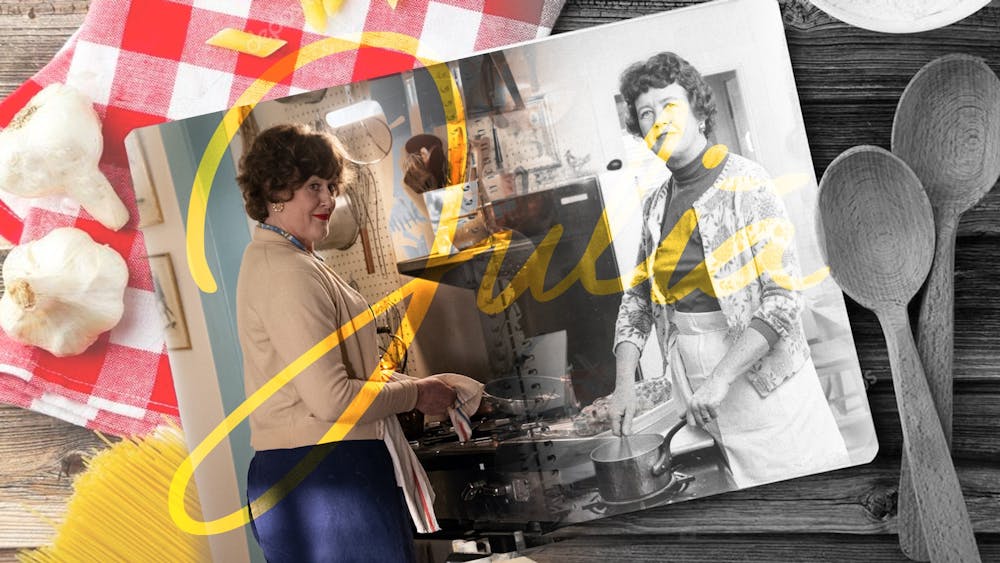“Bon Appetit!” Have those words ever been uttered more lovingly, tenderly, or warmly than by Julia Child as she signed off on an episode of The French Chef? It’s hard to say. Perhaps in France—by a maman to her bébé as she ladled some delicious concoction into a shallow bowl, or by a gourmet chef as he placed the finishing touches on the meal that would earn his Paris restaurant its third Michelin star. But in America? Not one other person can take so much credit for popularizing French cuisine and making it accessible to all as Child, who returned from France with the seminal 1961 cookbook Mastering the Art of French Cooking.
But it’s Child’s television career that is the focus of the new HBO series Julia, starring Sarah Lancashire in the title role. If Nora Ephron’s classic 2009 film Julie & Julia built upon the seeds that grew into the classic cookbook, as described in Child’s autobiographical My Life in France, this new show is the next chapter. It covers her rise as one of the first food show hosts, as she attempts to get her public television program on the air and develop a model for demonstrating culinary techniques to the new medium’s captive audience. Above all, however, this series offers a deeper perspective of Child's womanhood and her complex position as she wielded power and influence while working through insecurities.
Along the way to television success, Child overcomes plenty of obstacles, such as supplementing her show’s budget by teaching cooking classes or working in cahoots with her literary editor to slyly talk her husband Paul (David Hyde–Pierce) into seeing television as something more than a fad. Ultimately, the insecurities of Paul Child come through very strongly in the series. He makes a genuine effort, but still often struggles to navigate the new territory of playing second fiddle to his wife in the early '60s.
This is a different portrayal of the pair’s relationship than has come through in other media, from Paul’s behind–the–scenes role in Child’s real–life television presence to his characterization as a nearly flawless, completely supportive and engaged husband in Julie & Julia. Yet in many ways, this series differs is in its willingness to avoid painting an idealized image of both the woman and the relationship. And in many ways, this is its saving grace—other than the series’ inclination to offer up a grittier picture and Lancashire’s impressive performance, the series offers very little that is new or entertaining to the Julia Child story, instead leaning on forced, unrelated characters and unrealistic and sparse quips that don’t stick the landing.
Again, though, it's in the running theme throughout the season of Child's feeling insufficient within her womanhood that the show brings something new to her bountiful dining room table. One arc thus far involves her coming to terms with reaching menopause and feeling she must give up on her dreams of having children.
However, it’s in forging boldly ahead into her own career and future that we see Child at her most vulnerable and relatable, and most in contrast to her public image. She grapples with not being camera–friendly enough and having too distinctive of a sound. Her own father considers her to be not enough of a lady. With every step forward into her next chapter, she grows bolder and more confident, but also strays further from the mid–20th century ideal of a woman, repressed and subjugated. Due partially to this intensity of personality and even more so to her impressive stature (6’2”), any move she makes is given a sort of aggressive underpinning by the assuming masses working around her.
It's in the way that her image has persisted in its loving and lovable, effortlessly maternal nature, in spite of the preconceived schemas that drive public opinion, that I can relate to Child’s story and am inspired by her impact. From the perspective of this one tall, outspoken Julia, striving to make it through college without scaring too many people, the material of this new series and the potency of Child’s real–life legacy offers signs of hope for the future. It's proof that a kind heart and loving personality can pair with that existing power to shine through a tall suit of armor to create not just a mere favorable impression, but a conceptualization that radiates warmth.
Even though the show may not be great, I’m grateful for the reminder it serves of Child’s real perseverance and the extent to which she made an impact on the world. Beyond the bœuf bourguignon and the laughs, I'm reminded to thank Julia Child for being a role model.
If anyone knows where to find a loving personality, please let me know.







